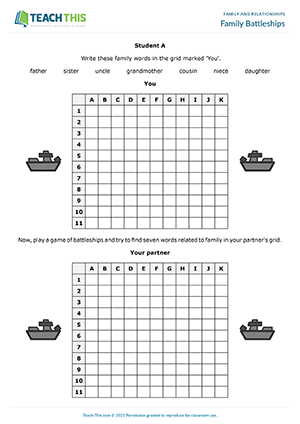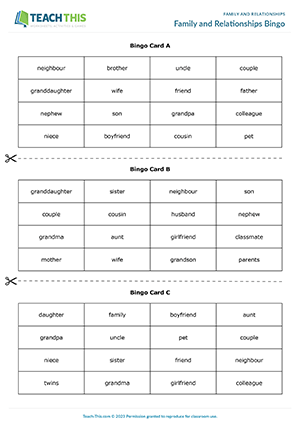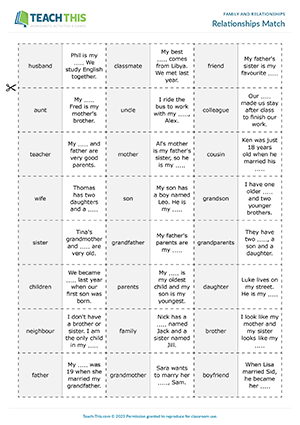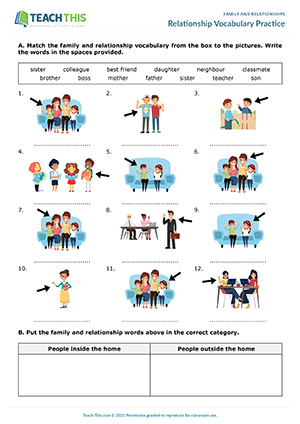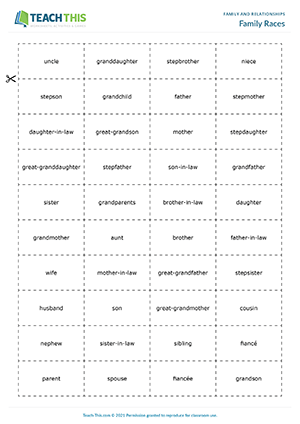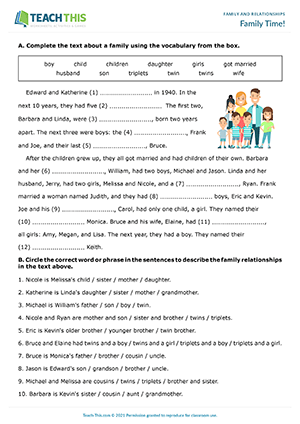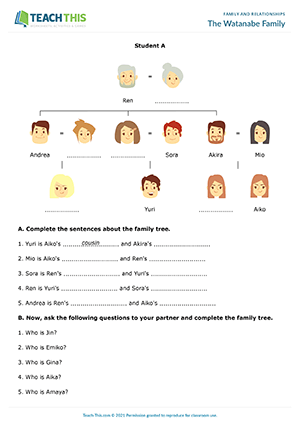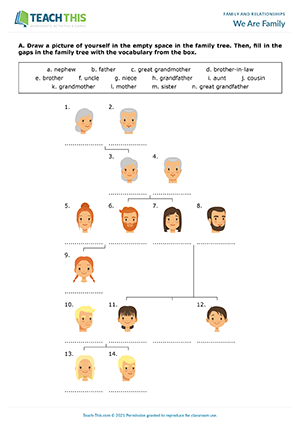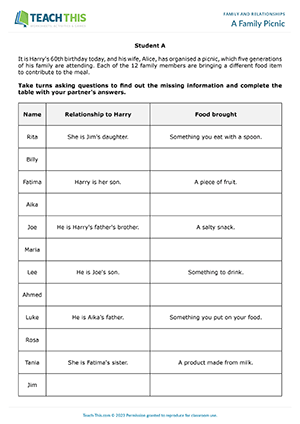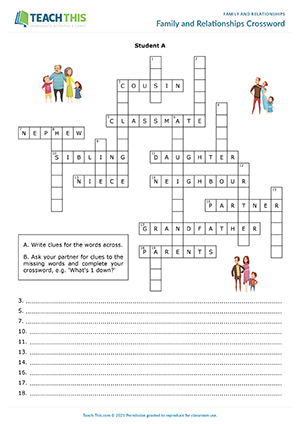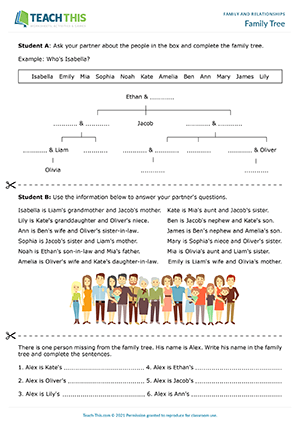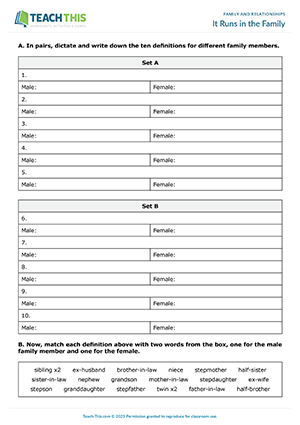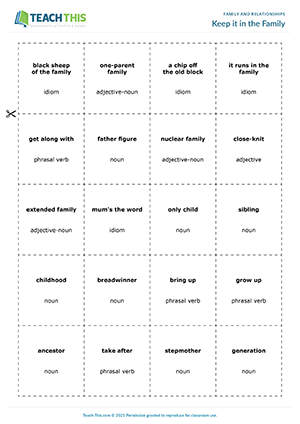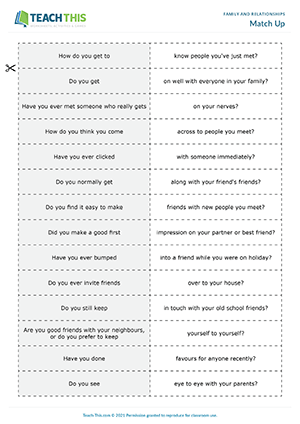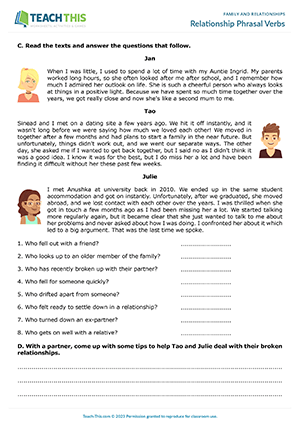In this enjoyable family vocabulary game, students play battleships to practice vocabulary related to family. Students begin by writing seven family words on their grid. Students then play a game of battleships where they have to find seven family-related words on their partner's grid. Students take it in turns to call out coordinates from their partner's grid on the worksheet. If their partner has a letter in that square, they say 'hit' and tell the student the letter. The student then writes the letter in the grid and has another turn. If their partner doesn't have a letter in that square, they say 'miss'. The student then draws an X in the grid and play passes to their partner. The first student to find all seven family words wins the game.
In this fun family and relationships vocabulary game, students play bingo by listening to definitions and matching them to family and relationship words. In groups, the bingo caller reads a definition at random from the caller's sheet. The other students listen and look at the family and relationship words on their bingo cards to see if they have a word that matches the definition. If they do, they cross it off. The game continues until a student has crossed off four words in a row. When this happens, the student shouts 'Bingo!' and then reads out the family and relationship words they crossed off. If the words match the definitions that were read out, the student wins the round. Students then continue to see who can cross off all 16 words. Groups play several rounds, with students taking turns to be the bingo caller and with players using a different bingo card each time.
Here are two entertaining family and relationship games to help students practice vocabulary related to family and relationships. First, students play a game of dominoes where they complete a sentence with a family or relationship word by placing a domino down either before or after the domino on the table. If the word matches the sentence, the player reads the sentence to the group to show the match is correct. The next player then tries to put down one of their dominoes at either end of the domino chain, and so on. The first player to get rid of all their dominoes wins the game. Next, students play a describing game to practice the vocabulary. Students take turns picking up a card and describing the family or relationship word in the grey square to the other students, who have 30 seconds to guess and say the word. If a student successfully guesses the word, they win and keep the card. If no one manages to guess the word, the card is removed from the game. The student with the most cards at the end of the game wins.
This free family worksheet helps elementary students learn and practice basic family and relationship words. To start, students match family and relationship vocabulary from a box to pictures. Students then categorize the family and relationship words into people inside and outside the home. After that, students match the relationship vocabulary to definitions. Students then move on to reorder words to make sentences. In the last exercise, students complete sentences with the family and relationship words from the worksheet.
These engaging family vocabulary games help students learn and practice a wide variety of family-related vocabulary. The games consist of a spelling relay, a board race and a descrbing game. In the spelling relay, two teams line up in front of the board. Show a family word card to the student at the back of each line. These students write the family-related word with their fingers on the back of the person in front of them. The word is written on the back of the next student and so on down the line until it reaches the student at the front. That student writes the word on the board. The first team to write the correct word on the board scores a point. In the family board race game, students listen to descriptions of family words and race to the board to grab the card that matches with the description. The first student to pick the right card scores a point for their team. In the describing game, students take it in turns to describe a family word on a card to their respective teams, e.g. 'Your mother's brother is your...' The first team to correctly guess the family word (e.g. uncle) wins and scores a point.
This comprehensive family worksheet helps students to learn and practice words that describe families and relationships. Students begin with a gap-fill exercise where they complete a text about a family using vocabulary from a box. Students then circle the correct word or phrase in sentences to describe the family relationships in the text. Next, students read descriptions and write the name of the person each description is about. In the last exercise, students write sentences using the vocabulary from the worksheet to describe their own family relationships or those of a family they know.
In this memorable family tree speaking activity, students practice family vocabulary by completing a family tree. In two groups, students look at the family tree and complete sentences on their worksheet. Students then pair up with someone from the other group and take it in turns to ask and answer questions in order to complete their family tree. Student A starts by asking 'Who is Jin?' Student B uses the completed sentences from the first exercise to answer the question, e.g. 'Jin is Aiko's cousin and Akira's niece'. Student A then writes the name in the appropriate place on the family tree. Students continue asking and answering the questions until they have both completed their family trees.
This rewarding family tree worksheet helps students learn and practice family vocabulary. First, students draw a picture of themselves in an empty space in a family tree. Students then fill in gaps in the family tree with vocabulary from a box. Next, students answer possessive questions about the names of family members. After that, students sort alternative words for family members into their correct categories. Finally, students do a word search where they locate family words from the worksheet.
Here is a useful family vocabulary activity to help students practice words related to family relations. First, in pairs, students do an information gap activity where they take turns asking questions about a family picnic and completing a table with their partner's answers. Students then unscramble letters to form family relations vocabulary. After that, students work with their partner and race to use the information in the table to complete sentences with the family relations vocabulary and food words in a box. The first pair to finish wins. Afterwards, check the correct answers with the class.
In this handy family crossword activity, students complete a crossword by describing and guessing words related to family and relationships. In two groups, students invent and write down clues for the family and relationship vocabulary written on their crossword. Next, students pair up with someone from the other group and take it in turns to ask their partner for a clue to one of their missing words. Their partner reads out the clue and the other student tries to guess the family or relationship word. If the student guesses the word successfully, they write it on their crossword. If not, their partner continues to give more clues until the student is able to guess the word. When the students have finished, they check their spelling by comparing crosswords.
In this free family tree speaking activity, students practice family vocabulary and possessives by working together to complete a family tree. The students' task is to complete a family tree by asking their partner about the people on the worksheet, e.g. 'Who's Isabella?' Their partner answers by explaining how the people in the family tree are related to each other, e.g. 'Isabella is Liam's grandmother and Jacob's mother'. The other student then completes the family tree with the information. When the students have finished, they swap worksheets and exchange roles. This gives both students a chance to ask the questions and helps to confirm the answers. Afterwards, the two students identify where a missing family member is on the family tree and complete sentences about how the person is related to the other family members. The first pair to complete the sentences correctly wins.
Here is an interesting family members speaking activity to help students practice family relations vocabulary. First, students take part in a running dictation. Student A is the writer, and Student B is the reader. Student B runs to 'Set A', reads the first family member definition, remembers it, runs back, and dictates it to their partner, who writes it down. This continues until the five definitions have been dictated. Students then swap roles for 'Set B' and repeat the process. Afterwards, pairs match each definition with two words from a box, one for a male family member and one for a female. The first pair to correctly match all the family relations vocabulary wins. Next, students take part in a speaking activity where they ask yes/no questions to guess which family member they are. A family member card is stuck to each student's back. Students then go around asking yes/no questions to their classmates who respond 'yes' or 'no' accordingly. After asking a few questions, students guess which family member they are. If students guess correctly, they remove the card from their back. If not, their classmates give them additional clues until they are able to guess the family member.
In this fun family vocabulary game, students describe and define nouns, adjectives, adjective-noun collocations, phrasal verbs and idioms related to family. In groups, students take it in turns to pick up a card and describe the family-related word or phrase to the other students, e.g. 'It's a noun. It means the son or daughter of an uncle or aunt'. The other students listen to the description and try to guess the answer, i.e. cousin. The first student to guess correctly wins and keeps the card. The student with the most cards at the end of the game is the winner.
In this insightful family phrasal verbs and idioms game and discussion activity, students form and ask questions containing phrasal verbs and idioms related to family and relationships. Students begin by playing a pelmanism game where they form questions by completing phrasal verbs and idioms. In groups, students take turns turning over one card from each set. If the two cards match to make a question, the student keeps the cards and has another turn. If not, the student turns them back over. The student with the most cards at the end of the game wins. Next, students take it in turns to ask the questions on their cards to the other group members and discuss the answers. When the students have finished, they report back to the class on what they found out.
This productive relationship phrasal verbs worksheet helps students practice phrasal verbs that are commonly used to talk about relationships. First, students complete sentences with prepositions from a box to create phrasal verbs related to relationships. Students then complete sentences with the prepositions and their own ideas. Next, students read three texts and answer questions, matching each question to a person from the texts. Finally, with a partner, students discuss two people's respective situations from the text and come up with some useful tips to help them deal with their broken relationships.
Latest Free
Resources
- The Bus Stop
Getting Around (B1)
Date Added: 1st of October
- Study Skills Showdown
Study Skills (B2)
Date Added: 10th of September
- Everyday Objects Bingo
Everyday Objects (A1-A2)
Date Added: 25th of August
- Action Verb Races
Actions (A1-A2)
Date Added: 18th of August
- Birthday Basics
Birthdays (A1-A2)
Date Added: 8th of August
Latest Member
Resources
- Casual Greetings
Greetings and Introductions (B2)
Date Added: 22nd of October
- Identifying and Clarifying Problems
Dealing with Problems (B2)
Date Added: 22nd of October
- What if we tried...?
Dealing with Problems (B2)
Date Added: 22nd of October
- Suitable Excuses
Making Excuses (B2)
Date Added: 21st of October
- Superlatives Showdown
Superlatives (A1-A2)
Date Added: 21st of October



